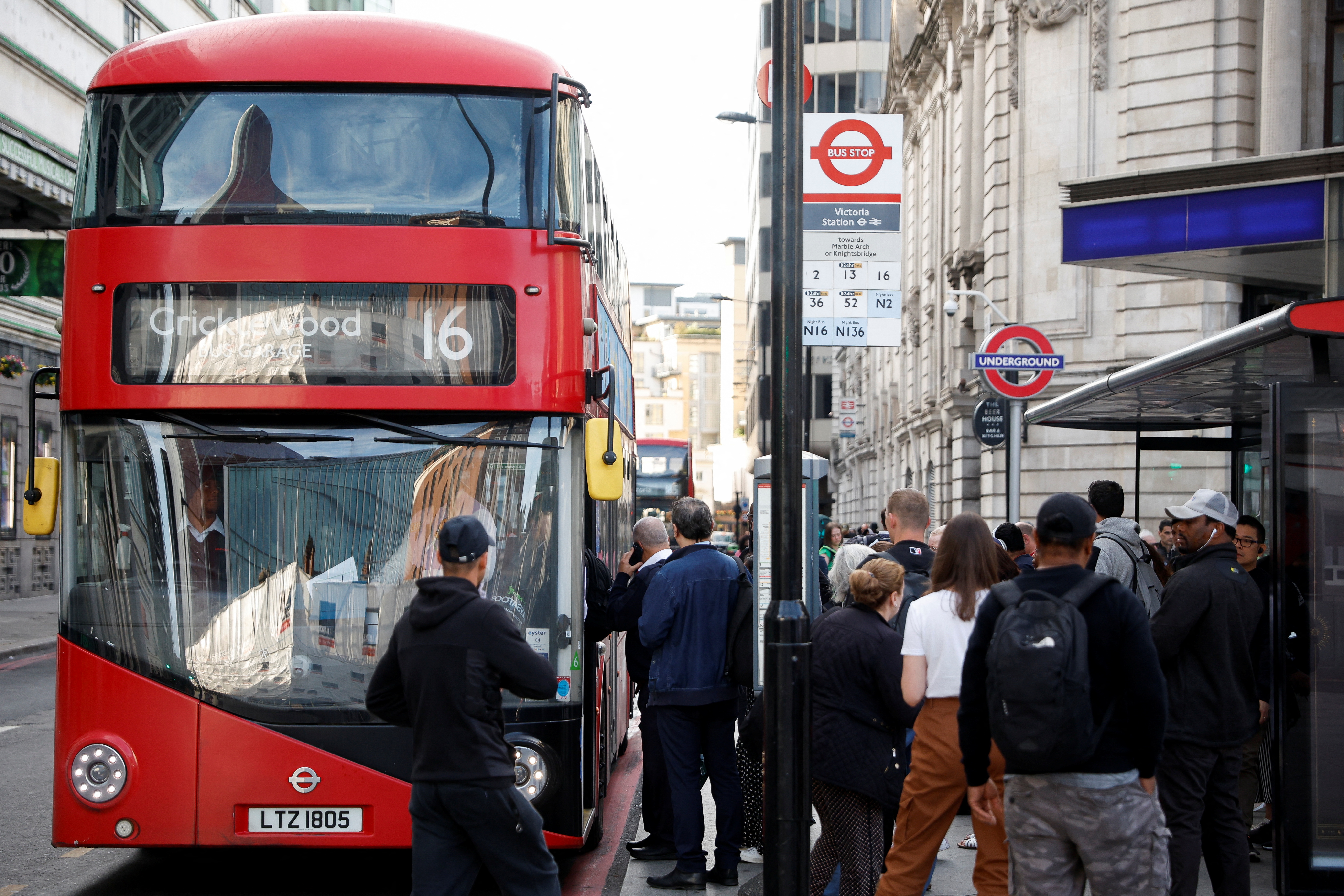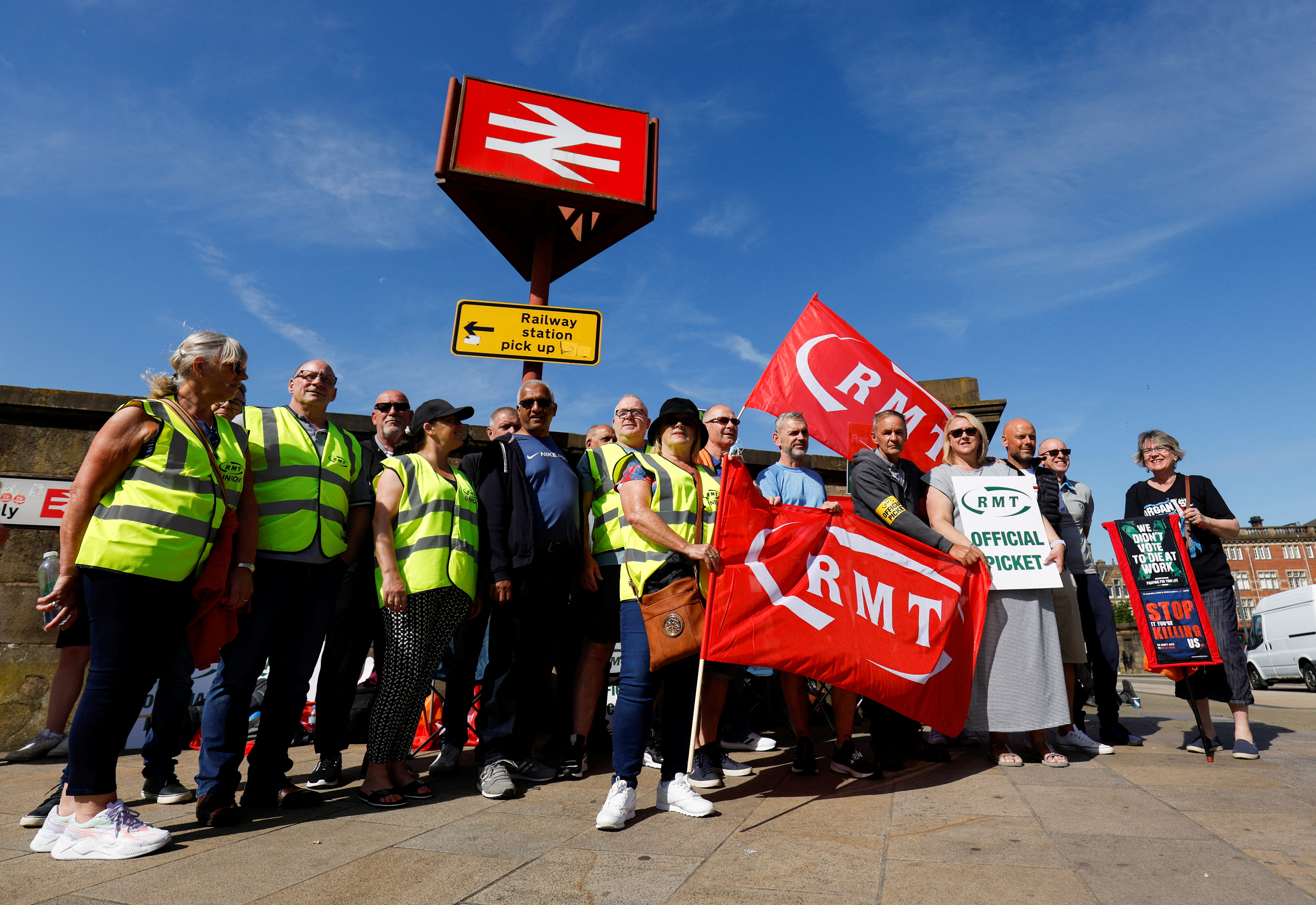mastermind
Rest In Power Kobe
LONDON, June 21 (Reuters) - Tens of thousands of workers walked out on the first day of Britain's biggest rail strike in 30 years on Tuesday, with millions of passengers facing days of chaos as both the unions and government vowed to stick to their guns in a row over pay.
The strike by more than 40,000 rail staff, which is due to be replicated on Thursday and Saturday, caused major disruption across the network, bringing most services to a standstill and leaving major stations deserted. The London Underground metro was also mostly closed due to a separate strike.
Prime Minister Boris Johnson, under pressure to do more to help Britons facing the toughest economic hit in decades, said the strike would harm businesses still recovering from COVID.
Unions have said the rail strikes could mark the start of a "summer of discontent" with teachers, medics, waste disposal workers and even barristers heading for industrial action as inflation pushes 10%. read more
"RMT members are leading the way for all workers in this country who are sick and tired of having their pay and conditions slashed by a mixture of big business profits and government policy," Mick Lynch, secretary-general of the Rail, Maritime and Transport Workers (RMT), said.
Network Rail said people should not travel by train unless absolutely necessary. Hospital staff said some colleagues slept at work overnight to maintain care.
Johnson told his cabinet the strikes were "wrong and unnecessary" and said his message to the country was that they needed to be ready to "stay the course" as improvements to the way railways are run were in the public's interest.
A survey by pollsters YouGov found public opinion divided, with 37% supportive of the action and 45% opposed.
Leo Rudolph, a 36-year-old lawyer who walked to work, said he would become more disgruntled the longer the dispute holds.
"This isn't going to be an isolated occurrence, right?" he said.



1/10
Rail workers strike outside Preston Station, on the first day of national rail strike in Preston, Britain, June 21, 2022. REUTERS/Jason Cairnduff
Inflation has soared across Europe on the back of a major rise in energy costs and Britain is not alone in facing strikes.
Action over the cost of living in Belgium caused disruption at Brussels Airport on Monday, while Germany's most powerful union is pushing for large wage increases and in France President Emmanuel Macron is facing unrest over pension reforms.
Britain's economy initially rebounded strongly from the COVID-19 pandemic but a combination of labour shortages, supply chain disruption, inflation and post-Brexit trade problems has prompted warnings of a recession.
The government says it is supporting millions of the poorest households but warns that above-inflation pay rises would damage the economy and prolong the problem.
Retail intelligence company Springboard said footfall in British high streets was down 8.5% compared to last week, and down 27% in central London.
Britain's railways were effectively nationalised in the pandemic, with train operating companies paid a fixed fee to run services, while the tracks and infrastructure are managed by state-owned Network Rail.
The RMT seeks a pay rise of at least 7% for its members, but it has said Network Rail offered 2%, with another 1% linked to industry reforms the union opposes. The government, criticised for not being involved in the talks, says unions must resolve it directly with employers.
The BBC reported that further talks were due on Wednesday but even an agreement would not prevent further disruption on Thursday.
The outbreak of industrial action has drawn comparison with the 1970s, when Britain faced widespread labour strikes that culminated in the 1978-79 "winter of discontent". read more
The government says it will now change the law quickly to make train operators provide a minimum service on strike days, and allow employers to hire temporary staff.
The strikes come as travellers at British airports experience chaotic delays and last-minute cancellations due to staff shortages, while the health service is teetering under the pressure of long waiting lists built up during the pandemic.
The strike by more than 40,000 rail staff, which is due to be replicated on Thursday and Saturday, caused major disruption across the network, bringing most services to a standstill and leaving major stations deserted. The London Underground metro was also mostly closed due to a separate strike.
Prime Minister Boris Johnson, under pressure to do more to help Britons facing the toughest economic hit in decades, said the strike would harm businesses still recovering from COVID.
Unions have said the rail strikes could mark the start of a "summer of discontent" with teachers, medics, waste disposal workers and even barristers heading for industrial action as inflation pushes 10%. read more
"RMT members are leading the way for all workers in this country who are sick and tired of having their pay and conditions slashed by a mixture of big business profits and government policy," Mick Lynch, secretary-general of the Rail, Maritime and Transport Workers (RMT), said.
Network Rail said people should not travel by train unless absolutely necessary. Hospital staff said some colleagues slept at work overnight to maintain care.
Johnson told his cabinet the strikes were "wrong and unnecessary" and said his message to the country was that they needed to be ready to "stay the course" as improvements to the way railways are run were in the public's interest.
A survey by pollsters YouGov found public opinion divided, with 37% supportive of the action and 45% opposed.
Leo Rudolph, a 36-year-old lawyer who walked to work, said he would become more disgruntled the longer the dispute holds.
"This isn't going to be an isolated occurrence, right?" he said.
INFLATION FEVER



1/10
Rail workers strike outside Preston Station, on the first day of national rail strike in Preston, Britain, June 21, 2022. REUTERS/Jason Cairnduff
Inflation has soared across Europe on the back of a major rise in energy costs and Britain is not alone in facing strikes.
Action over the cost of living in Belgium caused disruption at Brussels Airport on Monday, while Germany's most powerful union is pushing for large wage increases and in France President Emmanuel Macron is facing unrest over pension reforms.
Britain's economy initially rebounded strongly from the COVID-19 pandemic but a combination of labour shortages, supply chain disruption, inflation and post-Brexit trade problems has prompted warnings of a recession.
The government says it is supporting millions of the poorest households but warns that above-inflation pay rises would damage the economy and prolong the problem.
Retail intelligence company Springboard said footfall in British high streets was down 8.5% compared to last week, and down 27% in central London.
Britain's railways were effectively nationalised in the pandemic, with train operating companies paid a fixed fee to run services, while the tracks and infrastructure are managed by state-owned Network Rail.
The RMT seeks a pay rise of at least 7% for its members, but it has said Network Rail offered 2%, with another 1% linked to industry reforms the union opposes. The government, criticised for not being involved in the talks, says unions must resolve it directly with employers.
The BBC reported that further talks were due on Wednesday but even an agreement would not prevent further disruption on Thursday.
The outbreak of industrial action has drawn comparison with the 1970s, when Britain faced widespread labour strikes that culminated in the 1978-79 "winter of discontent". read more
The government says it will now change the law quickly to make train operators provide a minimum service on strike days, and allow employers to hire temporary staff.
The strikes come as travellers at British airports experience chaotic delays and last-minute cancellations due to staff shortages, while the health service is teetering under the pressure of long waiting lists built up during the pandemic.
/cloudfront-us-east-2.images.arcpublishing.com/reuters/6WBSBQGYIFMHRIV7FQ56BF7QO4.jpg)